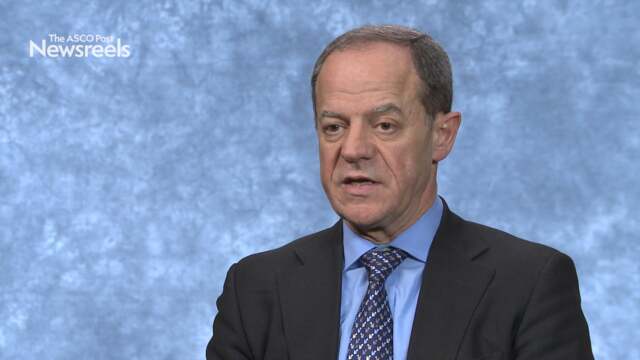Nicholas D. James, MBBS, PhD, on Prostate Cancer: Results From the STAMPEDE Trial
2018 Genitourinary Cancers Symposium
Nicholas D. James, MBBS, PhD, of University Hospitals Birmingham NHS Foundation Trust, discusses study findings on the addition of docetaxel to first-line hormone therapy in prostate cancer, an analysis focusing on cost-effectiveness and long-term and quality-adjusted survival (Abstract 162).
Thomas Powles, MD, of Barts Cancer Institute, discusses phase III study findings on atezolizumab vs chemotherapy in platinum-treated locally advanced or metastatic urothelial carcinoma, with an emphasis on immune biomarkers, tumor mutational burden, and clinical outcomes (Abstract 409).
Joaquim Bellmunt, MD, PhD, of the Dana-Farber Cancer Institute, discusses phase III 2-year follow-up findings on pembrolizumab vs investigator’s choice (paclitaxel, docetaxel, or vinflunine) in recurrent, advanced urothelial cancer (Abstract 410).
Jonathan E. Rosenberg, MD, of Memorial Sloan Kettering Cancer Center, discusses longer-term efficacy and safety findings on nivolumab monotherapy in metastatic urothelial carcinoma (Abstract 414).
Paul L. Nguyen, MD, of the Dana-Farber Cancer Institute, summarizes a session he chaired on prostate cancer, which included discussion of daily vs weekly image-guided radiotherapy; a biomarker to predict biochemical failure and metastasis; a comparison of abiraterone or enzalutamide activity; and the impact of 18F-fluciclovine PET/CT on clinical management choices for men with biochemically recurrent disease (Abstracts 4, 5, 164, 165).
Fatima Karzai, MD, of the National Institutes of Health, discusses phase II findings on olaparib and durvalumab in metastatic castration-resistant prostate cancer in an unselected population (Abstract 163).





